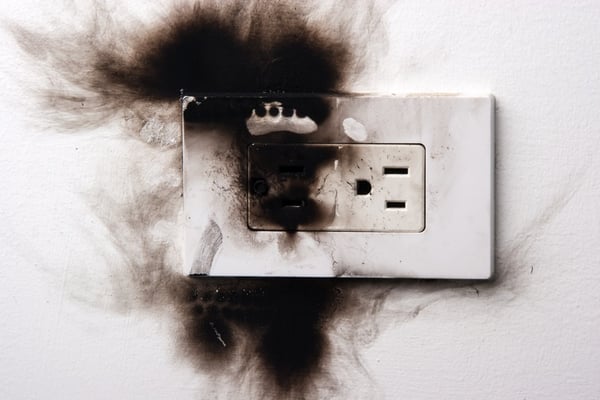
Did you know that nearly 50,000 fires each year are electrical fires, according to the NFPA (National Fire Protection Agency)?
They are surprisingly common, and their causes are all around us in our home and workplaces. It is vital that you understand some basics about electrical fires should you ever encounter one.
1. Lots of Things Can Cause Them
Unfortunately, several very common items and activities can result in an energized electrical fire: faulty wiring, old appliances, portable heaters, damaged power cord, a short circuit, overloaded electrical outlets, overcharged and overheated devices.
2. DON’T Use Water!
Water acts as a conductor, allowing the electricity to travel, which could result in electrocution. Furthermore, because the water will conduct the electricity, that means it will essentially spread the source of the fire’s ignition, and thus the fire as well.
NEVER use water or a water-based fire extinguisher as long as there is still electricity powering the fire!
3. Cut Off the Power Source
If the fire hasn’t spread beyond the electrical item that caused it, then unplugging or shutting off the power to that item could kill the fire.
Regardless of whether it is enough to kill the fire, however, you will need to cut off the power source if it can be done safely. This is because as long as electricity continues to power the appliance/device/equipment, there will continue to be a source of ignition. The fire either won’t be able to be put out, or it could just keep reigniting if the power source is not cut off.
4. Use the Right Suppressant
Not all fire extinguishers work for electrical fires. If you have a fire extinguisher in your home, make sure that it includes the label Class C, which means that it uses an electrically nonconductive extinguishing agent appropriate for electrical fires.
5. Most are Preventable
Most electrical fires start as a result of old and damaged wiring, overloaded outlets, and/or incorrectly charged electronic devices. These things are easily avoidable.
Be sure to check your wiring and electrical cords to ensure there are no twists, frays, or exposed wires. Review your outlets and power strips to make sure they are not being overloaded. If you use power strips, make sure they include internal circuit breakers, which can reduce the risk of electrical accidents.
Next Steps
If you would like to avoid encountering electrical fires, make sure to do a walk through of your home or work-space and keep an eye out for electrical hazards. They are easy to correct.
However, sometimes prevention is not enough. Be sure to have a proper fire extinguisher in your home or office in case of such an emergency.
Not sure you have what you need? The experts at Koorsen can talk and walk you through your unique property and fire protection needs. Give them a call or contact them online today!

